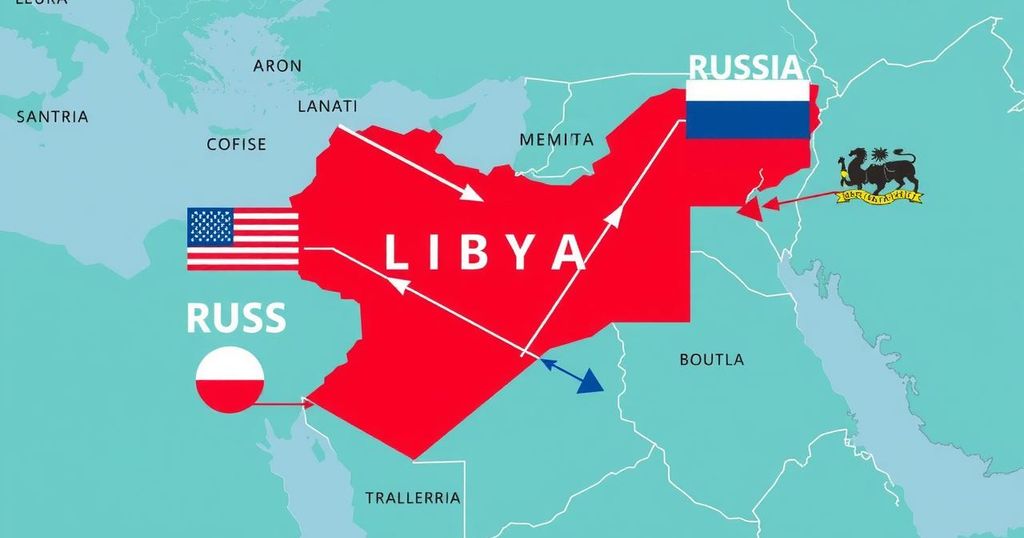Libya: A Battleground for U.S.-Russia Influence Amidst Trump’s Diplomacy

The article discusses the geopolitical rivalry between the U.S. and Russia in Libya, focusing on attempts by the U.S. to influence Gen. Khalifa Haftar amidst growing Russian military presence. While U.S. military interests are being asserted, skepticism remains about potential outcomes, particularly concerning ties with Haftar’s son, Saddam. The future of U.S.-Libya relations appears uncertain as the Trump administration remains noncommittal on engagement.
In recent developments regarding geopolitical dynamics, former President Donald Trump demonstrated a willingness to engage with Russian President Vladimir Putin while disregarding traditional alliances. However, Libya remains a focal point of intense rivalry between the United States and Russia, amplifying Cold War sentiments without any signs of reconciliation.
The U.S. Air Force recently stationed a B-52 bomber in Libya as part of strategic efforts to persuade local leaders, notably Gen. Khalifa Haftar, to expel the growing contingent of Russian troops from their desert outposts. The primary goal of this engagement is to curtail Russian influence, which utilizes Libya as a strategic base to support adversarial regimes in the region.
The U.S. military’s outreach coincided with a visit by Haftar and his sons to Belarus, which underscores their strengthening ties with Russia. Analyst Jalel Harchaoui noted that U.S. diplomatic initiatives are effectively being spearheaded by the Pentagon, given the Biden administration’s lack of a coherent policy towards Libya, alongside Trump’s historical disinterest in the situation.
In response to U.S. efforts, Haftar has expressed a willingness to collaborate while simultaneously acknowledging the military support he receives from Russia. While U.S. military officials extended invitations to Haftar’s forces, skepticism lingers over whether these gestures can effectively sway Haftar away from his Russian allies.
The developments at the Brak al-Shati airbase, where Russian troop numbers have reportedly surged, further complicate this diplomatic landscape. Experts like Ben Fishman express doubt about Haftar’s potential pivot, given the existent disparities between military structures in eastern and western Libya.
Conversely, some analysts, such as Mohamed Eljarh, suggest that there may be potential for improvement in U.S.-Libya relations through Haftar’s son, Saddam, who is allegedly seeking to establish connections with the United States. Although there is concern regarding the Russians’ dual strategy involving Haftar and another key figure, Saif Al-Islam, the future remains uncertain.
The question persists whether the Trump administration will engage in reciprocal measures should Saddam pursue closer relations with U.S. interests. As analyst Umberto Profazio noted, there have been no definitive signs indicating a shift towards increased U.S. involvement, leading to speculation that American support may inadvertently allow for more considerable Russian entrenchment in the region.
In summary, the geopolitical contest in Libya exemplifies ongoing tensions between the United States and Russia, with both nations vying for influence through local leaders like Gen. Khalifa Haftar. Despite U.S. efforts to engage Libya’s military forces, significant hurdles remain, including challenges posed by Russian military support and ongoing skepticism regarding the effectiveness of American diplomacy. The involvement of emerging figures like Saddam Haftar may hold the key to future U.S.-Libya relations, but definitive actions from the Trump administration have yet to surface, leaving the situation precarious and unresolved.
Original Source: www.defensenews.com







